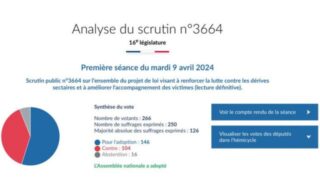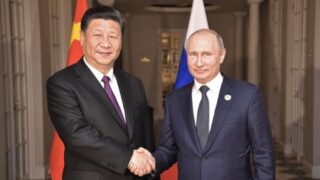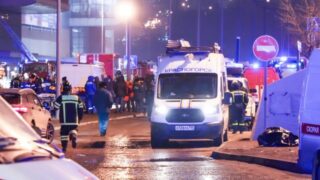The Russian anti-cult leader ridiculously claims that “thousands of recruited agents” report to Kyiv movements of troops and military trains. Many of them, he says, are “cultists.”
by Massimo Introvigne


Leading anti-cultist Alexander Novopashin, who was affiliated until March 2023 with the French-supported European federation of anti-cult movements FECRIS, has recently complained that “Bitter Winter” is persecuting him by paying an excessive attention to his statements. We agree with him that Novopashin is not particularly important personally, but he is representative of a broader category: Russian professional enemies of “cults,” whose ideology is a poisonous cocktail of the Putin regime’s criminal ideology and FECRIS-style anti-cultism, who are either unleashed or kept quiet based on the political needs of the moment.
After the war of aggression against Ukraine, they have been mostly unleashed—to spread anti-Ukrainian theories as preposterous as possible. I should also admit that, compared to the other leading Russian anti-cultist, Alexander Dvorkin, whose grin exudes pure malevolence, Novopashin, who rather resembles one of Gogol’s obtuse bureaucrats, at least provides some comic relief.


One recent incarnation of Novopashin is as an expert of espionage. In an article he reprinted on his website on December 13 last, he told “News of Siberia” that the Ukrainian intelligence has recruited “thousands” of agents in Russia to spy on military infrastructures, movements of troops, and military trains. We read in the newspaper that in addition to the “sad followers of Navalny,” described as “a foreign agent and a terrorist,” Ukrainian spies are recruited among members of the “cults.”
The dramatic problem is that the Russian intelligence leaders have not fully understood this. They need Novopashin to tell them where the Ukrainian spies hide. “Most often,” Novopashin explains, “arrests of Ukrainian spies occur in new regions of the country,” i.e., in parts of Ukraine occupied by Russia. The Archpriest thus accuses Ukrainians to spy for Ukraine—in Ukraine. “But the SBU [Ukrainian intelligence service] is seeking to expand its agent network, which is why recruits are detained even in Siberia,” Novopashin adds.
“In fact,” the anti-cultist explains, “thousands of recruited agents have been exposed, the press reports only the most resonant cases. It is obvious that it is difficult for the intelligence services to calculate such a number of agents. It is necessary to reduce the scale of the problem in a different way… large-scale counter-propaganda is necessary to suppress enemy recruitment activities. Citizens of the Russian Federation should know in detail how foreign intelligence works, how recruitment occurs, and what threats potential agents face for such actions. All this should be presented with modern and historical examples, as clearly as possible. But, unfortunately, such work is not being conducted. Perhaps there is no result due to the fact that the task is at the intersection of the powers of civilian and law enforcement agencies. I myself have repeatedly suggested this to various people, but it seems that no one really listens. … We need a broader and smarter view of the problem, and this is not just a matter for the intelligence services.”


If many of those recruited are “cultists,” the intelligence services are not enough. The motherland needs “smart” anti-cultists such as Novopashin. And they are ready to serve, looking for Ukrainian spies among the “cults.” The Siberian newspaper, no doubt following a suggestion by Novopashin, links an old list of 58 “cults” (plus number 59, “many others”), which includes everything from the Latter-day Saints to the Jehovah’s Witnesses, and from Scientology to Soka Gakkai. Novopashin singles out the persecuted New Generation Church, which he calls “a blasphemous parody of Christianity, an occult cultic movement.”
These “cults” are so numerous… It looks like Novopashin as a spy catcher has a monumental task ahead of him.








